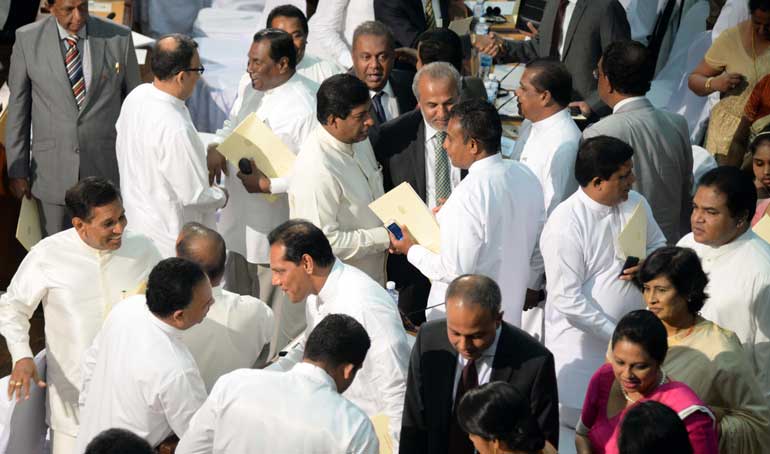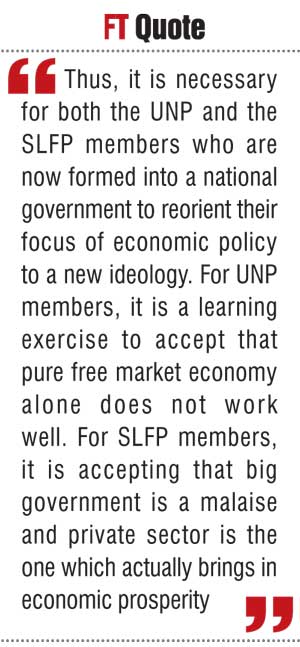Thursday Feb 26, 2026
Thursday Feb 26, 2026
Monday, 14 September 2015 00:10 - - {{hitsCtrl.values.hits}}
 The onus of creating and running an economic democracy will lie chiefly on the newly-appointed National Government
The onus of creating and running an economic democracy will lie chiefly on the newly-appointed National Government
The promise of ushering in a social market economy
The election manifesto of the United National Party (UNP) which won the highest number of parliamentary seats at the recently held General Elections describes its economic policy as a ‘Knowledge-based Competitive Social Market Economy’.
The manifesto does not say much about it except presenting the basic features underlying the new economic system in a brief preamble. Accordingly, it represents a Third Way, a way different from extreme socialism and extreme capitalism. 
Both these extreme ways, says the Manifesto, have proved to be socially, politically and economically unacceptable and therefore the need for searching for a Third Way. The preamble says that it is a more advanced “people-friendly economy system”. It combines, according to the preamble, the competitive market economy with overall governmental intervention in the economy to assure the delivery of social benefits to people.
There are ‘safety nets’ to protect the socially and economically disadvantaged groups and ‘systems’ to conserve the environment. Thus, its aim is to deliver ‘economic democracy’ to people by widening the frontiers of the open economy policy being in place in Sri Lanka since late 1970s.
A detailed policy document on the policy is needed
A manifesto which is addressed to ordinary voters cannot explain in detail everything that a political party is planning to implement once it comes to power. But before it starts implementing it, it is absolutely necessary to translate it into a detailed policy document explaining everything that it contains. It would avoid ambiguity on the part of those who are to implement it and disabuse the minds of people who are to benefit from it. It also generates a free public discussion of the policy thereby helping the policy implementers to redesign the policy on the basis of the criticisms they have received.
Presenting a policy for public discussion before it is implemented is an essential requirement under good economic policy governance to which the present Government claims itself to be committed and “economic democracy” which the policy has promised to deliver to people.
The partners to the National Government are traditionally not for a social market economy
There is another vital reason that calls for the preparation of a detailed policy document announcing the new economic policy of the Government. That is because it is two opposing forces that have joined hands to form the so-called National Government in power today to steer the country forward during the next 60-month period. With this social market economy, the UNP which has traditionally followed a pro-market economy policy has added a new dimension to its policy framework. That is a market economy system with proper Government interventions to regulate the economy and safety nets for the underprivileged.
The Sri Lanka Freedom party or SLFP which has joined the Government as a partner of the National Government is famous for adopting policies that upgrade the Government to the highest position in economic management.
For instance, the Mahinda Chinthana which it upheld till the day of the election on 17 August 2015 was basically for a big Government with very little private sector participation. Accordingly, key enterprises that had previously been privatised had been reacquired by the state sector.
Notable examples are the Sri Lankan Airlines and the Litro Gas. New state sector enterprises like the loss making Mihin Air and not-so-profitable Lanka Puthra Bank, Sri Lanka Savings Bank and now defunct SME Bank were formed with state capital.
When the State enterprises made losses, such losses were liberally recouped with generous grants from the Treasury even without parliamentary approval. A number of private enterprises were expropriated by the Government under the guise of improving their conditions because, according to the Government, they were underperforming or being underutilised. Using the national funds like the EPF and ETF which came under the management control of the Central Bank and the Ministry of Finance respectively, a number of key private banks were brought under effective Treasury control thereby gaining powers to appoint Chairmen and majority board members.
The need for de-education and re-education of national government partners
Thus, it is necessary for both the UNP and the SLFP members who are now formed into a national government to reorient their focus of economic policy to a new ideology. For UNP members, it is a learning exercise to accept that pure free market economy alone does not work well. For SLFP members, it is accepting that big government is a malaise and private sector is the one which actually brings in economic prosperity. 
It calls for two simultaneous operations: de-education and re-education. De-education is necessary to take out the old dogma which has been indelibly imbedded in their thinking system. Re-education is to pump it with the new ideology being pursued by the government. In my view, the government should go into two processes immediately.
One is the preparation of a detailed policy document outlining the ideals incorporated into the ‘knowledge based highly competitive social market economy. The other is to send all Parliamentarians in the national government, and possibly the opposition members as well, together with leading bureaucrats back to school as is continuously done by China using its Party School System. That would facilitate the direction of the national policies in terms of the ideals of the social market economy policy being pursued. It also will prevent the individual micro level polices from being misaligned with the same ideals.
Reward and punishment code of the free market economy system is harsh
Free market economy has been hailed as the best allocator of resources in an economy to maintain its efficiency on a sustainable basis. But the punishment and reward code of the free market economy system has been very harsh. If someone does well in a free market economy system, he is rewarded with profits, success and prosperity. By the same token, those in the opposite camp are punished with losses, bankruptcies and adversities. The delivery of such rewards or punishments is objectively determined by the market with no role for personal likes or dislikes to play in the passing of the judgments. Accordingly, those who can run faster can reach the goal post easily. The others who cannot do so would lag behind and are bound to perish. Then, it makes the economic prosperity exclusive, meaning that only a select crowd would enjoy the fruits of development. This development is in accordance with nature’s dictum aptly coined by the 19th century British philosopher Herbert Spencer as ‘Survival of the Fittest’ in his 1864 book ‘Principles of Biology’. But, can it be allowed to happen? Societies throughout history have fought against this natural development by introducing measures to save those unfit brethrens from the destined perish.
Exclusive economic prosperity allowing a select group to enjoy the fruits of prosperity to be avoided
Kautilya, the 4th century BCE Indian Guru and Statesman laid down in his treatise on economics, The Arthashastra, that one of the duties of the king is to safeguard the welfare of the people since king’s happiness lies in the happiness of his subjects. Accordingly, the king has to look after both the fit and the unfit equally. All major religions have a commandment for their followers to help the unprivileged.
In today’s context, there is a valid economic reason to avoid ‘exclusive economic prosperity’ in society. That is, such exclusiveness in prosperity leads to social, political and economic chaos threatening a society’s capacity to sustain its prosperity. Hence, inclusive economic prosperity has been upheld by modern societies as a goal. In this context, social market economy policy combining both the free market economy system with social safety nets is in line with both the historical trends and modern economic goals.
Germany has ownership for social market economy policy
Social Market Economy Policy is not new and has existed for more than six and a half decades as the main economic policy ideal of Germany. After that country was fully devastated by the World War II, the Christian Democratic Union government led by Chancellor Konrad Adenauer adopted a social market economy as the key driver of government policy.
At that time, Germany was frustrated with the Laissez Faire Economic Policy promulgated by pure capitalism and the extreme state management of the economy enshrined in the communist economic policy system. Hence, a midway, coined as the ‘Third Way’ was searched for and the result was the introduction of the Social Market Economy Policy that combined the virtues of capitalist system with the need for ensuring the welfare of the people.
Key element of social market economy is to accept both the market and the need for governmental intervention
Germany’s social market economy had the following key features. It recognised the validity of the free market economy system as an efficient allocator of resources with its free determination of prices in the market.
Accordingly, it accepted the following key four features of the free market economy system: private property, free foreign trade, free exchange of goods and free determination of prices. While accepting that economic prosperity is being brought by the free market economy, Germany also accepted that the Government also has an important role to play in facilitating the operations of the private sector and looking after the vulnerable groups in society.
An important role assigned to the government was to regulate the economy to create a level playing field for businesses, prevent the formation of monopolistic businesses, take care of the citizens in their old age through a sustainable social security system funded by the government, employers and workers jointly and introduce social policies covering education, healthcare, housing and employment for all.
Knowledge and competition are a must
These ideals were announced in an abridged manner by the Christian Democratic Union as follows: “Social Market Economy system is the socially anchored law for the industrial economy, according to which the achievements of free and able individuals are integrated into a system that produces the highest level of economic benefit and social justice for all. This system is created by freedom and responsibility, which find expression in the ‘social market economy’ through genuine performance-based competition and the independent control of monopolies. Genuine performance-based competition exists when the rules of competition ensure that, under conditions of fair competition and equal opportunity, the better performance is rewarded. Market-driven prices regulate the interaction between all market participants”
Today’s dictum: Ignore knowledge and perish
Thus, Germany’s policymakers had accepted both knowledge and competition as key strategies to establish a social market economy in that country. Knowledge is important because the continuing prosperity of modern economies is based on their having relevant and appropriate knowledge and using such knowledge productively in producing goods and services for the market, both local and foreign.
Sri Lanka’s customisation of the social market economy has highlighted this vital ingredient for attaining sustainable economic growth. It requires the country to spend more resources for education, research and development and use of research outputs in producing goods and services for the market.
Singapore did this since it attained its independence in 1965. It built world-class universities by getting the local universities to team up with the best universities in USA. It allocated more resources for research and development year after year. When the new millennium broke in, it got its universities and higher learning institutions to concentrate on fields that would elevate Singapore to the status of a knowledge-based economy. Some such fields are genetic, biomedical and biotechnology research, nano technology, information and communication technology and entertainment. A country today cannot think of attaining sustainable economic prosperity by disregarding the value of knowledge.
Economic democracy means allowing people to choose for themselves
UNP manifesto has promised that in establishing a social market economy it would deliver ‘economic democracy to people’. Sri Lankans had been enjoying political democracy of electing or ousting their rulers for nearly seven decades. Economic democracy is different from political democracy in the sense that it is concerned with the choices of people relating to major economic problems: what to produce, how to produce and for whom to produce. In a free market economy, these decisions are made by the markets but markets have now been captured by corporate magnates and politicians.
But, people are the supreme choosers in an economic democracy. Hence decision making powers in an economic democracy are shifted from corporate magnates in the private sector and politicians and bureaucrats in the state sector to people. It therefore requires a complete overhaul of the Government’s decision-making machinery.
In an economic democracy, instead of a few politicians or bureaucrats making choices for people, it will be the people themselves who will make choices for them. Hence, economic decision making at national, regional and local levels will have to be made after wide consultation with people. But people are diverse and dispersed and therefore cannot be consulted effectively and efficiently. To overcome this issue, two changes could be made to the prevailing system in Sri Lanka. One is the empowerment of the civil society institutions so that they could echo the sentiments of people on key economic policy decisions. The other is the use of the social media to learn of the views of people on such policies.
The executive and the bureaucracy should learn to heed to people’s choices
But the most important responsibility in creating and running an economic democracy rests with the President, Prime Minister, Cabinet Ministers, State Ministers and Deputy Ministers. They should have a system in place in evaluating the views of the people, assess their validity and relevance and make a public announcement whether those views are accepted without modification or adopted with modification. If they reject those views in toto, that decision should also be made known to people through a public announcement assigning reasons for same.
If this change is not effected in the executive machinery of the Government, the delivery of economic democracy to people of the country will just be another promise confined only to paper. The next article will discuss how economic democracy should be delivered.